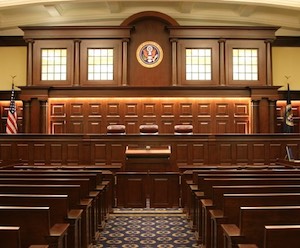Each week, we succinctly summarize the preceding week of Federal Circuit precedential patent opinions. We provide the pertinent facts, issues, and holdings. Our Review allows you to keep abreast of the Federal Circuit’s activities – important for everyone concerned with intellectual property. We welcome any feedback you may provide.
– Joe Robinson, Bob Schaffer, Lindsay Henner, and Puja Dave
82.1 Federal Circuit Dismisses Reexamination Appeal By a Party Who was Not Initial Requester
Agilent Techs., Inc. v. Waters Techs. Corp., No. 2015-1280, 2016 U.S. App. LEXIS 1441 (Fed. Cir. Jan. 29, 2016) (Before Moore, O’Malley, and Taranto, J.) (Opinion for the court, O’Malley, J.). Click Here for a copy of the opinion.
Water Technologies sued Aurora for infringing the ‘609 patent, for chromatography systems that use a pump for supercritical fluid chromatography (“SFC”). Aurora filed a request for inter partes reexamination of all the claims. Agilent alleged that around August 2012, it acquired most of Aurora’s assets and agreed to be bound by the outcome of the ‘609 inter partes reexamination and infringement litigation. After the examiner issued its Action Closing Prosecution in September 2012, Aurora submitted third-party comments. Nothing at this time was filed to identify Agilent in the reexamination. The examiner rejected all claims of the patent, and Waters appealed. Aurora cross –appealed and also filed a request to change the real party in interest to Agilent.
The Board reversed all of the rejections, and adopted a new ground of rejection proposed by Aurora in the cross-appeal for claims 1, 2, and 9-11. At this time, the Board listed Aurora as the third-party requester and Aurora’s counsel as counsel for the requester. Agilent appealed.
 Waters argued that Agilent could not appeal, because Aurora was the third-party requester of the inter partes reexamination, not Agilent. The Court held that the relevant question was whether Agilent was a member of a class of litigants that may enforce a legislatively created right under 35 U.S. C. § 141 (reexamination appeals). If so, that party has a ‘cause of action’ under the statute, and this cause of action was a necessary element of his ‘claim.’ See Davis v. Passman, 442 U.S. 228, 239 (1979). The Court held that both 35 U.S. C. § 141 and 35 U.S. C. § 315(b) confirm that the right to appeal an adverse reexamination decision is reserved only to patent owners and third-party requesters. The Court further noted that 35 U.S.C. § 100(e) defines “third-party requester” to mean a person requesting ex parte reexamination under section 302 or inter partes reexamination under section 311 who is not the patent owner.
Waters argued that Agilent could not appeal, because Aurora was the third-party requester of the inter partes reexamination, not Agilent. The Court held that the relevant question was whether Agilent was a member of a class of litigants that may enforce a legislatively created right under 35 U.S. C. § 141 (reexamination appeals). If so, that party has a ‘cause of action’ under the statute, and this cause of action was a necessary element of his ‘claim.’ See Davis v. Passman, 442 U.S. 228, 239 (1979). The Court held that both 35 U.S. C. § 141 and 35 U.S. C. § 315(b) confirm that the right to appeal an adverse reexamination decision is reserved only to patent owners and third-party requesters. The Court further noted that 35 U.S.C. § 100(e) defines “third-party requester” to mean a person requesting ex parte reexamination under section 302 or inter partes reexamination under section 311 who is not the patent owner.
Agilent argued that the requester is the person “requesting” reexamination as of any given point in time, not necessarily the person who requested it initially. The Court declined to answer whether a successor-in-interest becomes a third party requester under the statute, because Agilent had never established that it was Aurora’s successor-in-interest. The Court explained that it was not until approximately eight months after the asset transfer and one month after the cross-appeal that the Board was given notice that Agilent was the “real party in interest.” Aurora’s counsel also never withdrew from the proceeding, and Aurora remained the party to the litigation. The Court further noted that Agilent did not provide a copy of the asset transfer agreement to the court, and the Declaration of Agilent’s Assistant General Counsel establishing the transfer was incomplete. The Court concluded that Agilent had ample opportunity to establish itself as Aurora’s successor-in-interest but failed to do so. Thus, the Court dismissed the appeal.

![[IPWatchdog Logo]](https://ipwatchdog.com/wp-content/themes/IPWatchdog%20-%202023/assets/images/temp/logo-small@2x.png)



![[Advertisement]](https://ipwatchdog.com/wp-content/uploads/2024/04/Patent-Litigation-Masters-2024-sidebar-early-bird-ends-Apr-21-last-chance-700x500-1.jpg)

![[Advertisement]](https://ipwatchdog.com/wp-content/uploads/2021/12/WEBINAR-336-x-280-px.png)
![[Advertisement]](https://ipwatchdog.com/wp-content/uploads/2021/12/2021-Patent-Practice-on-Demand-recorded-Feb-2021-336-x-280.jpg)
![[Advertisement]](https://ipwatchdog.com/wp-content/uploads/2021/12/Ad-4-The-Invent-Patent-System™.png)







Join the Discussion
No comments yet.